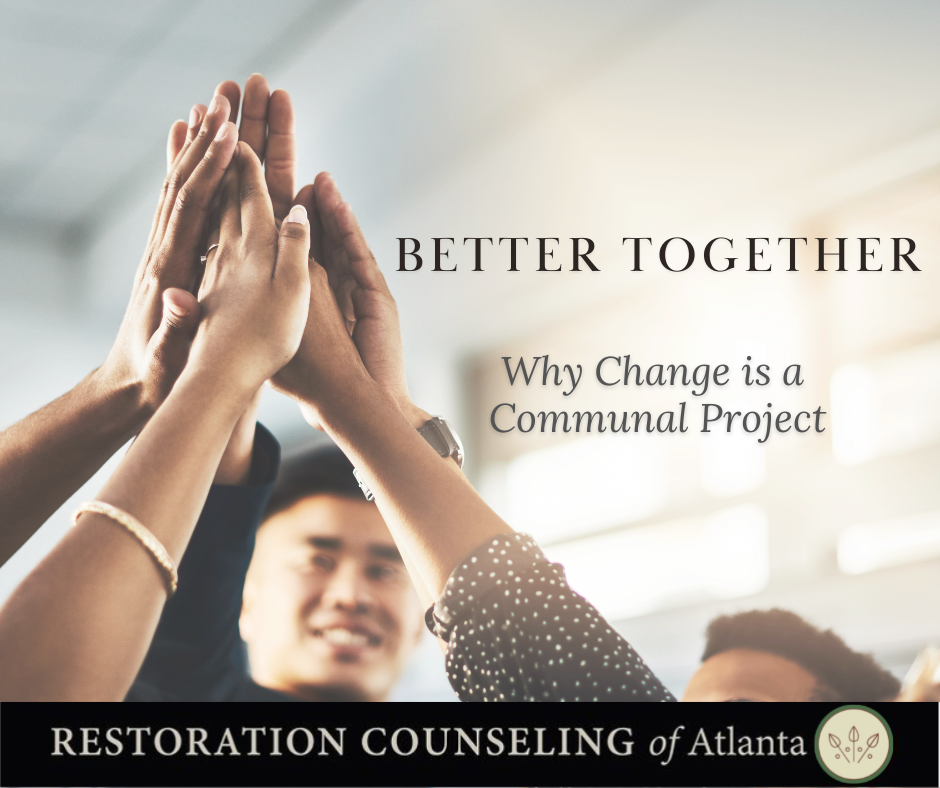Why Change Is a Communal Project
Solo Growth Is, Well… Really Hard
Your most formidable foe is you.
If you’ve ever tried to change a longstanding habit or negative emotional pattern, you’ll know what I mean. Anyone who’s ever tried to grow–and that’s most of us–will, if we are honest, have to admit that the process of change is infuriatingly slow, twisty-turny, and oftentimes seems downright hopeless.
Why? Is the world conspiring against your growth? Maybe, but probably not. Most people in your life would probably love to see you grow. The truth is, most of us are our own worst enemies. Out of all our foes, our most formidable, in one sense, is the person we spend the most time with: ourselves. The truth is, we simply have conflicting and disordered desires, we carry wounds from the past, and we’re rarely as talented in the art of rational thought as we’d like to think we are.
So, what’s the solution? Well, it would be reductionistic to say there is only one solution, but let me offer one solution that most of us don’t value or cultivate nearly enough, especially in our fragmented, individualistic, isolated age: authentic community.
Authentic community happens in many contexts, including the local church, support groups, mentorship, professional counseling, families, accountability relationships, and everyday friendships.
If you’re willing to lean into community instead of strategically avoiding it, you’re both courageous and wise, because the journey to cultivate community will not be easy, but it will be worthwhile. The fight for community will take hard work, patience, and you’ll probably have to forgive a few people along the way (You’ll have to ask for forgiveness sometimes, too.)
And why is a healthy community so helpful? Here’s a short list of reasons, which correspond to the reasons we’re so unlikely to grow in isolation:
- An authentic community can inspire you and hold you accountable to live in accordance with your values and deepest desires.
- An authentic community can minister to your wounds by knowing you fully and loving you deeply.
- An authentic community can help you think more rationally by getting you out of your head and into conversation.
God’s Gentle, Persistent Call to Community
“Iron sharpens iron, and one man sharpens another.”
-Proverbs 27:17
No tool is sharpened without friction, and although relationships with other people are sometimes uncomfortable–while allowing another person to see us for what we are makes us squirm–there is no way to truly grow without the loving encouragement and strong accountability that a healthy, authentic community provides.
On the other hand, if healthy relationships sharpen us, then isolation dulls us. This makes us vulnerable to selfishness and willfully ignorant of the wisdom other people could speak into our lives (Proverbs 18:1).
So, if you’re living as a loner, tread with caution. The question is not if you will need help–it’s when. Don’t wait until you face a major obstacle in life to build community. At that point, you might need help right away, but relationships take time to build. Make sure that if you fall, you know who’s around to pick you back up (Ecclesiastes 4:9-10).
Though participation in a local church is only one manifestation of a healthy community, it’s one we can’t afford to overlook. The book of Hebrews admonishes Christians to persevere in faith and repentance until the end–to finish our races well. So, if you want to be sure you don’t end up dropping out of your spiritual race, run with others. Gathering together protects against discouragement and spiritual apathy as we face suffering, temptation, and the mundanity of life (Hebrews 10:24-25).
If you are a Christian living apart from the body of Christ, you’re like an eye or a hand or a foot trying to live apart from the rest of the body. Your gifts are beautiful, unique, and truly helpful, but they only function properly in the context of an interdependent system (1 Corinthians 12:14-21).
According to Jesus, the two most important commandments are to love God and to love people (Mark 12:30-31). It’s only by entering the lives of other people and being willing to bear their burdens that we can obey the commandment to love other people (Galatians 6:2). If you’re willing to sacrifice for others in this way, you may find a community willing to help you carry your burdens, too.

Jon Hunt enjoys working with teens, adults, and couples on issues including ADHD, anger, anxiety, panic attacks, and phobias, depression and suicidality, grief and trauma, insomnia, marital and premarital needs, pornography and behavioral addictions, and substance addictions. Jon uses insights from evidence-based therapeutic approaches but always stays grounded in the truth of God’s word.
jon@restorationcounselingatl.com, ext. 123

